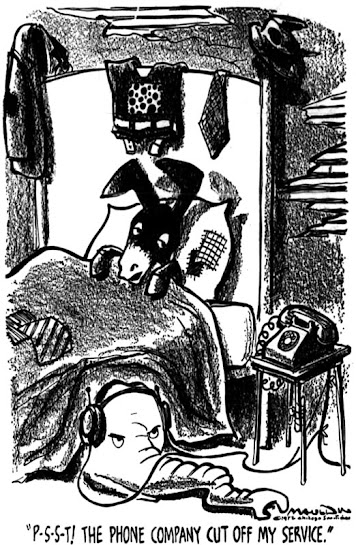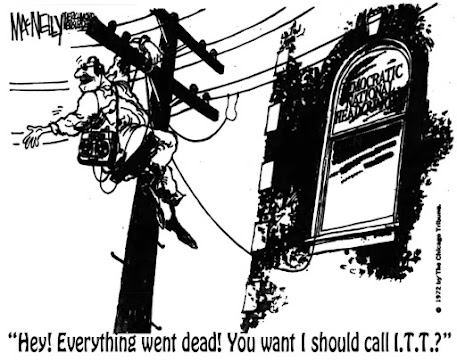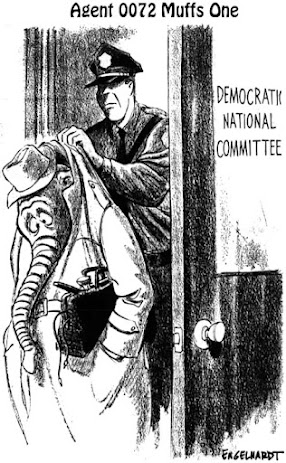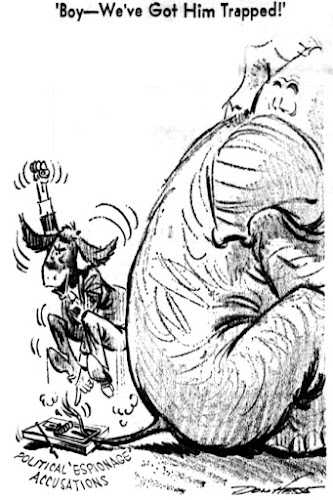 |
| "He Says He's From the Phone Company" by Paul Conrad in Los Angeles Times, June, 1972 |
The House's televised "January 6th" hearings this month coincide with the fiftieth anniversary next Friday of the Watergate break-in: the "third-rate burglary" that brought down Richard Nixon's presidency.
 |
| "This Is Where The Democratic Platform Committee Will Meet" by Gene Basset for Scripps Howard Newspapers, ca. June 19, 1972 |
A so-called plumbers squad of Republican-affiliated operatives were caught breaking into the offices of the Democratic National Committee, which was preparing for the party's national convention the next month. The Democratic Party's likely presidential nominee, Sen. George McGovern, representing the party's anti-war, "New Left" insurgent faction, had just won primaries in California, New Mexico, and his home state of South Dakota.
 |
| "The Phone Company Cut Off My Service" by Bill Mauldin in Chicago Sun-Times, ca. June 24, 1972 |
It was still too early to count out the more establishment Democratic candidates, Hubert Humphrey and Edmund Muskie. Alabama Governor George Wallace, seriously wounded in an assassination attempt in May, despite a strong showing in Michigan, was a very long shot.
 |
| "When Did You First Begin..." by Don Wright in Miami News, June 20, 1972 |
At the time, McGovern's chances of unseating President Nixon were regarded as slim at best, so bugging Democratic national headquarters seemed an overreaction by the Nixon campaign to McGovern's candidacy. The White House's earlier involvement in sabotaging the campaigns of the Democrats' more establishment candidates would come to light only later as the scandal unfolded.
 |
| "What Makes You Jump to the Conclusion that I'm a Republican" by Guernsey LePelley in Christian Science Monitor, by June 26, 1972 |
No indeed, there wasn't a great deal of mystery as to why someone would want to burgle the Democratic National Committee headquarters.
 |
| "Who Would Think of Doing Such a Thing" by Herbert Block in Washington Post, June 20, 1972 |
Paul Conrad and Herblock (the latter working at the newspaper of Woodward & Bernstein) were not the only ones to note that the burglars' tactics resembled those of the Nixon administration. John Mitchell and Richard Kleindienst in this cartoon were Nixon's first Attorney General and Mitchell's newly-minted successor in the office.
 |
| "Everything Went Dead" by Jeff MacNelly in Richmond News Leader, ca. June 27, 1972 |
The ITT scandal, referenced in some of these cartoons, surfaced the previous February when investigative columnist Jack Anderson exposed internal memos at International Telephone & Telegraph that implied a connection between the company's political donations to the Republican Party and Nixon's Justice Department settling an antitrust case in ITT's favor.
 |
| "Agent 0072 Muffs One" by Tom Engelhardt in St. Louis Post-Dispatch, June 20, 1972 |
Around the corner from the Post-Dispatch offices, Engelhardt's counterpart at the Globe-Democrat pooh-poohed the importance of the Watergate break-in — as he would continue to do right through the House Judiciary Committee impeachment hearings two years later.
 |
| "Boy—We've Got Him Trapped" by Don Hesse in St. Louis Globe-Democrat, before June 26, 1972 |
The Watergate break-in was discovered in the wee hours of a Saturday. The following Monday, the Supreme Court ruled against the Nixon administration in a case where his Justice Department had wiretapped suspects without prior judicial approval. Justice Powell's ruling in U.S. v. U.S. District Court applied Fourth Amendment protections:
"Though physical entry of the home is the chief evil against which the wording of the Fourth Amendment is directed, its broader spirit now shields private speech from unreasonable surveillance. ... The price of lawful public dissent must not be a dread of subjection to an unchecked surveillance power. Nor must the fear of unauthorized official eavesdropping deter vigorous citizen dissent and discussion of Government action in private conversation. For private dissent, no less than open public discourse, is essential to our free society."
 |
| "Empty..." by Ken Alexander in San Francisco Chronicle, June 21, 1972 |
Ken Alexander's cartoon also cites the Justice Department's unsuccessful prosecution of San Francisco Mayor Joseph Alioto in an antitrust case (just one of several news events such as Hurricane Agnes vying for attention that week). But Alioto's was a mostly local issue, whereas the Nixon administration's fondness for wiretapping real and perceived enemies was an integral factor in the Watergate scandal.
 |
| "Such an Interesting Creature..." by Pat Oliphant in Denver Post, ca. June 24, 1972 |
Oliphant's cartoon stars the Chair of the Democratic National Committee, Lawrence O'Brien, and would be the first of a swarm of cartoons making a play on the word "bug" ...
 |
| "Your Kid Has Been Bugging Me" by Tony Auth in Philadelphia Inquirer, June 20, 1972 |
...one way or another.
No comments:
Post a Comment